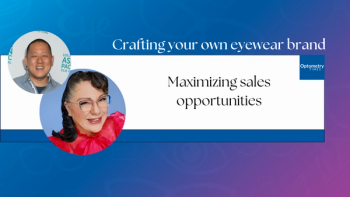
IKA 2024: Keratoconus from the patient perspective
Melissa Barnett, OD, Director of Optometry at the University of California, Davis, talked about her session at IKA that focused on keratoconus from the patient perspective.
Melissa Barnett, OD, Director of Optometry at the University of California, Davis, talked about her session at IKA that focused on keratoconus from the patient perspective.
Video Transcript:
Editor's note: The below transcript has been lightly edited for clarity.
Melissa Barnett, OD:
Hi, I'm Melissa Barnett out of the University of California Davis. At the IKA meeting we talked about keratoconus from the patient perspective. Now, the patient perspective is so important when we're talking about keratoconus. We shared information with a patient advocate about the importance of appropriate diagnosis and management of keratoconus. We also showed a video about the patient advocate's perspective of living with keratoconus and how life was prior to keratoconus and also after keratoconus. One thing that we talked about in our session was the Clearly KC podcast. This podcast is in collaboration with the National Keratoconus Foundation and is aimed for patients and practitioners to talk about all of the intricacies of keratoconus. And on the podcast, we have all sorts of guests including patients of keratoconus, specialists who are eye care specialist but also allergists, other specialists who specialized in Down Syndrome. We share the stories of patients so please share this podcast with your patients so that they can learn and know all the resources that are available for people with keratoconus.
We also talked about all the other things that come with keratoconus, such as the psychology around the condition and the various resources like the National Keratoconus Foundation that we have to help our patients. So, keratoconus is a condition that we see all the time. It's actually much more prevalent than what was previously thought and it's something that we can diagnose in our clinics. So both with advanced technology and also without. So say you don't have any advanced technology in your practice, you can examine the glasses prescription, look at the refraction. See if there's an increase in astigmatism. Look for a change in prescription going from the prior prescription to the updated prescription. Ask patients about the history of allergies eye rubbing. If you do have advanced technology such as corneal tomography, it is very beneficial to image that posterior cornea to look for any changes. But the reason why it's so important to diagnose early is that we can treat our patients. We can stabilize the cornea with corneal collagen cross-linking.
Now, keratoconus is diagnosed often in young, healthy individuals. So people who have never had any problems maybe have never had an eye exam have had changes in glasses and contact lenses. And otherwise, they're healthy individuals for the majority. And so it can be a very life changing diagnosis. And some patients are told that they need a corneal transplant and they're going to go blind. So it's very scary. And that's why it's so important to diagnose. And we can treat and manage with cross-linking early to prevent corneal transplantation. But as practitioners we need to be sensitive and very aware of the patient's journey and be empathetic and know the resources in order to help our patients.
So there are resources like guides from the National Keratoconus Foundation in English and Spanish that we can share with our patients. There are patient support groups where patients can talk to each other and learn from each other. And we do need to be aware of the psychological impact of the condition–how keratoconus affects quality of life. And also there are other resources like job related resources as well. So it's important to share all this information with our patients know that they're supported. There's a great community out there of many people trying to help so that keratoconus does not negatively affect quality of life and many individuals with keratoconus are living wonderful lives and we have great options now
Newsletter
Want more insights like this? Subscribe to Optometry Times and get clinical pearls and practice tips delivered straight to your inbox.













































